He was 91 years old when the doctors told him they had discovered a malignancy. The family was scheduled to meet with the doctor to discuss options. Knowing the meeting would be difficult, they asked their minister to accompany the family for the consultation.
Ruth McCommon, wearing her lab coat and nursing pins, agreed.
McCommon is a new kind of minister: a congregational nurse. She is known throughout her church — First Baptist Church, Peachtree City, Ga. — as the lady with the lab coat.
“People stop me in the hall and say, ‘The doctor said this. What do you think about it?’ ” she said. Her job is simply to be a bridge between faith and health.
When she makes hospital or nursing home visits, her conversations are a mixture of medical jargon and spiritual guidance. When someone is sent to hospice, she can help him or her understand what to expect.
When a young mother is at a Bible study and finds herself sick, her friends take her to McCommon. When someone is dying, she is often the first minister the family calls.
“I’m a minister,” she is quick to say. “I’m not a nurse who works in a church.”
Her qualifications for ministry came early in life and hard. Her third child died at four months from Sudden Infant Death Syndrome. Her husband died at 40 after five years of fighting cancer. At 38 she found herself a widow with two teenage daughters: one was a diabetic, the other suffered from epilepsy.
When her children were raised, she finished her nursing education, went to seminary and headed for the mission field in Africa. While serving there she contracted both malaria and hepatitis C — both diseases she still must deal with.
“I learned early what sustains me,” she says. “Compassion drives me to do what I do.”
“Ruth is able to do things I can’t do, things I don’t know how to do,” said Steve Bingham, senior pastor at McCommon’s church.
“Some pastors feel threatened when someone ministers to ‘their’ people,” Bingham admits. “My main concern is what are we doing for that person?
“I hug their necks, read Scripture and pray. But Ruth goes way beyond that,” he said. “She enhances our ministry.”
In 1983, a chaplain in a Lutheran hospital in Chicago and his daughter, a nurse, conceived the idea of a “parish nurse.” Word quickly spread of the spiritual-medical position, and other groups began the program that originated in a hospital. In 1995 Georgia Baptist Health Care System (GBHCS) began developing the program.
Currently six congregational nurses work in Georgia churches sized small to large. GBHCS provides supervision and training for nurses, as well as organizational guidance for churches.
“It’s a church/hospital partnership,” says Jean Holley, director of congregational health for the health care system. Holley supervises the nurses and provides emergency medical consultations, as well as ongoing education and mentoring.
“I help the church know how to organize,” she says. “I work with committees to deal with the nuts and bolts of organization, as well as the legal issues.”
Holley also maintains a resumé file, screening possible candidates to ensure they are professionally competent, as well as mentally and spiritually mature.
“We offer qualified nurses, but the church makes the final decisions. It’s easier since many times a pastor or personnel committee isn’t always able to judge professional [medical] competency,” she explains.
The nurses typically are hired as part-time ministers, from 16-24 hours a week, and earn a salary comparable to the community standard for professional nurses, says Holley.
All congregational nurses take clinical-pastoral education as part of their training, and all are required to take the congregational-nurse preparation course offered by the Georgia Baptist College of Nursing every July. (ABP)
Congregational nurse bridges faith and health
Related Posts

FDA, researchers seek methods of early detection of Alzheimer’s
October 1, 2024
A new blood test could help doctors diagnose Alzheimer’s disease more accurately in a primary care setting, leading to crucial

Alzheimer’s, dementia: Pastor shares lessons learned
August 12, 2019
As a minister for more than 40 years, Mike Glenn walked through the valley of dementia and Alzheimer’s disease with

Shame isolates, destroys community, psychiatrist says
October 13, 2016
Nobody needs a psychiatrist to explain what shame feels like — we all know, said Curt Thompson, a noted psychiatrist
Prenatal classes catalyst for new life, faith, churches
January 22, 2015
The young woman gingerly crawls off a motor scooter, grateful for the ride. Before, Kalliyan Seng could make the two-mile

Share with others: